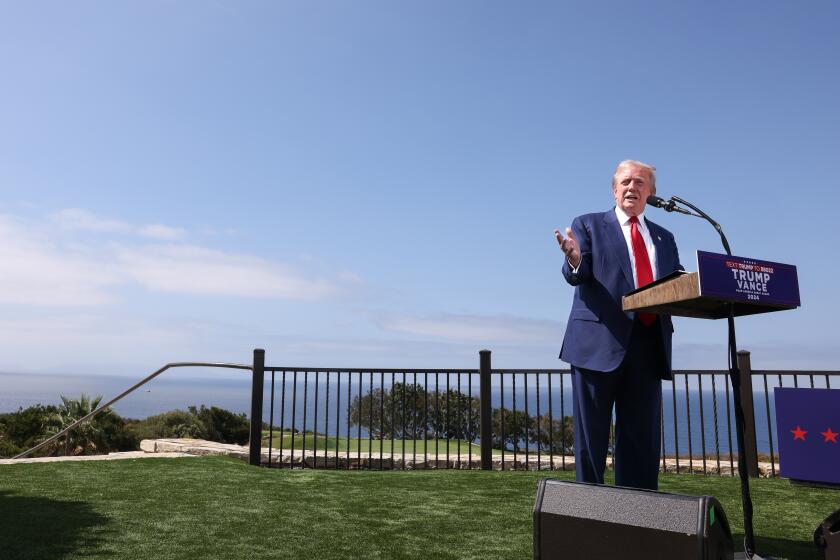Court nominee Liu follows the law
There are some left-wing ideologues on law faculties, but UC Berkeley’s Goodwin Liu is not one of them. He is a fine choice for the federal bench.
A noisy argument has persisted for weeks in the Senate, on blog sites and in newspaper columns over President Obama’s nomination of Liu to the U.S. 9th Circuit Court of Appeals. This political spat over a single appellate judge makes no sense if one looks at Liu’s academic writings and speeches, which reflect a moderate outlook. Indeed, much of this may have nothing to do with Liu but rather with politicians and interest groups jostling for position in the impending battle over the president’s next nominee to the Supreme Court.
Liu submitted voluminous material in his answers to a Senate questionnaire, and then more material in supplemental answers after some senators claimed that the first answers were not enough. (When I worked on the John G. Roberts Jr. and Samuel A. Alito Jr. nominations as the chief White House ethics lawyer for President George W. Bush, we learned that the first document delivery, no matter how massive, is never enough.) From all of the law review articles, speeches and other material Liu has submitted, it is quite clear that he is a moderate liberal, that he is open to ideas championed by libertarians and conservatives, and that he is intelligent and capable of being a good judge.
Liu respects the law, which is what we should expect of a judge. He has not written articles that ignore the laws and the Constitution and then cite some dubious authority for his arguments. He has not embraced many of the obscure yet trendy theories that left-wing academics advance. He has written about the law and how the law affects people — perhaps in a way that conservatives do not always agree with, but he has written about the law.
Many of Liu’s publications concern legal issues in primary and secondary education. Given the state of many public schools in the United States, education is a critically important area for policy proposals. Liu has many good ideas, including the possibility of using school-choice and voucher programs to allow students to escape substandard conditions that are particularly hard for poor and minority students.
The fact that Liu is willing to risk political fallout for suggesting ideas unpopular with many in the left wing of the Democratic Party shows that he is guided by integrity rather than political expediency.
Liu is also quite clear in his writings that he envisions most of his proposals being implemented through the legislative process, not by the courts. He shows no signs of being a potential judicial activist.
What the Senate should ask with respect to all of the president’s nominees to the bench is whether their political perspective is within the range of reason. Are they so liberal — in fact radical — that they cannot be trusted to interpret and apply the Constitution and the law when the only reasonable interpretation is inconsistent with their desired social outcome? Are they so conservative that they would condone something outside the realm of reason, such as torture, as being consistent with the Constitution and the laws of the United States? If so, these are the nominees the Senate should reject for lifetime appointments to the district and appeals courts. Liu does not come close to either of these extremes.
There is also no need for all federal judges to be alike. In fact, Liu was quite critical of both the Roberts and Alito nominations to the Supreme Court, something that some conservatives now hold against him. This opposition to Liu is misguided; it is important that people speak their mind about Supreme Court and other judicial nominations without fear of retribution.
Unfortunately, few of Liu’s critics are interested in these arguments. Many are only interested in demonizing him, probably to show the president and the Democrats on the Senate Judiciary Committee that they can challenge a nominee they don’t like.
Then there is another motivating factor: money. This is an election year, and fights over judicial nominations motivate the base of both political parties to contribute to political campaigns and off-the-books entities that do the work of political campaigns without the regulations that apply to them. I saw frantic fundraising by both sides in the Roberts and Alito confirmation fights, and I see it now.
Sadly, this is what the process has become for choosing not only our political leaders but also judges for our federal courts.
Richard W. Painter is a law professor at the University of Minnesota and the author of a recent book on government ethics. He served as chief White House ethics lawyer for President George W. Bush from 2005 to ’07.
More to Read
Get the L.A. Times Politics newsletter
Deeply reported insights into legislation, politics and policy from Sacramento, Washington and beyond. In your inbox three times per week.
You may occasionally receive promotional content from the Los Angeles Times.










